14 Amazing Benefits Of Fenugreek Sprouts For Skin, Hair And Health
Fenugreek is easy to sprout, tasty, and loaded with micro-nutrients that do you a world of good.

Image: Midjourney/ StyleCraze Design Team
Fenugreek, often used in traditional medicine, is not only tasty but also offers a range of health benefits. Fenugreek sprouts are amazing for managing diabetes, cholesterol, and even menstrual pain! And they are easy to sprout too! Fenugreek sprouts are made by soaking the seeds overnight and then letting them sprout into tiny saplings. These are essentially more nutritious as the germination process has already begun, breaking down the complex nutrients into simpler more absorbable forms. Here in this article, we take a look at the health benefits of these plant-based sprouts and ways to include them in your diet.
 Know Your Ingredient: Fenugreek Sprout
Know Your Ingredient: Fenugreek SproutWhat Is It?
A tiny, two-leaved, green sprout with a bitter taste that is made from soaking fenugreek seeds overnight.
What Are Its Benefits?
It helps manage diabetes, cholesterol, and weight and improves skin menstrual health.
Who Can Consume It?
Anybody can consume them, especially people with diabetes can eat this healthy snack.
How Often?
You can consume 1-2 teaspoons of fenugreek sprouts daily.
Caution
Avoid consuming fenugreek sprouts if you are breastfeeding. Excess consumption may result in stomach discomfort, gas, and headache.
In This Article
Health Benefits Of Fenugreek Sprouts:
1. Rich Source of Medicinal Properties
Fenugreek in any form is a treasure trove of medicinal properties. It is rich in vital nutrients like vitamin C, proteins, fibers, niacin, potassium, iron and alkaloids. It is also rich in a bioactive compound called diosgenin, a steroidal saponin (1).
2. Fenugreek Sprouts For Diabetes Control
The benefits from consuming fenugreek sprouts for those living with diabetes are astounding. Fenugreek boasts of properties enabling it to stimulate the production of insulin in the body to counteract elevated sugar levels in the blood (2). Research on patients with Type 2 diabetes have shown a much lower level of sugar in their blood streams within 24 weeks of daily consumption of fenugreek (3). It is a rich source of amino acids that effectively induces the production of insulin for diabetic relief.
3. Fenugreek Sprouts For Weight Loss
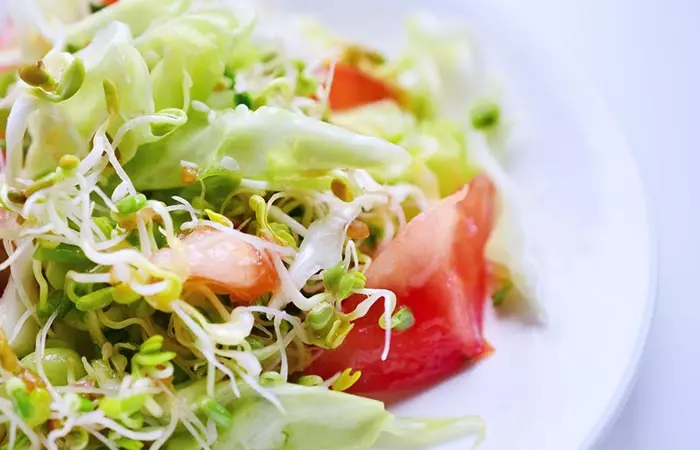
Fenugreek seeds are rich in a polysaccharidei The most common kind of carbohydrates in the food, and serve either a structural or an energy-storing purpose. known as galactomannan, it gives a feeling of fullness thus discouraging overeating. Fenugreek contains about 75% soluble fiber which also simulates a feeling of fullness (4), (5). Hence, fenugreek is a double-action solution for weight watchers.
 Quick Tip
Quick Tip4. Fenugreek Sprouts For Cardiac Health
Fenugreek is known to have cardiovascular benefits and studies have shown people who consume fenugreek on a daily basis have lower levels of cholesterol and hence lower risks of heart attack (6) (7). It also effectively controls levels of the fatty deposits found in blood called triglycerides which are responsible for cardiovascular complications (6). It is an effective source of potassium, which regulates levels of sodium thus balancing heart rate and blood pressure (8) (9).
5. Anti-Viral Properties Of Fenugreek Sprouts
It is known to possess anti-viral properties, which effectively help relieve symptoms of cold, sore throat, and sinusitisi An inflammation of the tissue lining the sinuses that can be triggered by cold or allergies (acute) or an infection or growth (chronic). (10), (11).
6. Rich Source of Antioxidants
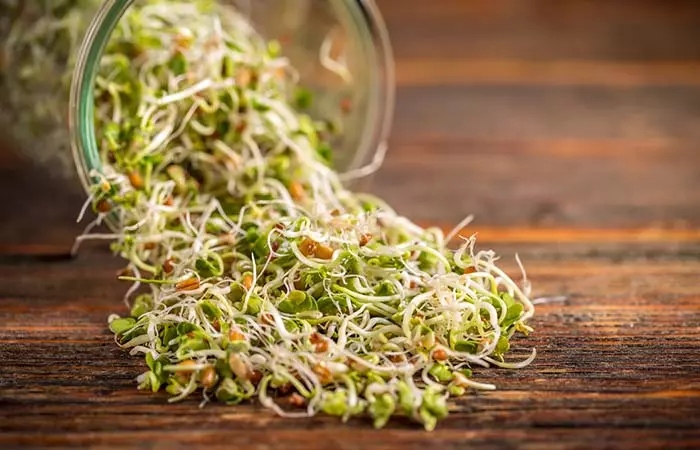
Fenugreek seed sprouts are natural sources of antioxidants that combat free radicals in our bodies that create much damage to our cells (12). Hence, they may help reduce the risk of certain cancers (13).
7. Fenugreek Sprouts for Digestion
According to Indian traditional medicinal practices, fenugreek has long been used to aid digestion (14). Hence, you may use these nutrient-dense germinated legumes to boost your digestive health.
8. May Help Relieve PMS and Menopause Symptoms
Fenugreek may help regulate menstruation cycles and alleviate the discomfort, hot flashes, and mood fluctuations, which are common symptoms of PMS and menopause (15) (16).
9. May Help Induce And Ease Childbirth
Fenugreek in limited portions has been known to induce and ease childbirth due to its ability to stimulate uterine contractions and is also known to reduce labor pains (17). However eating large amounts during pregnancy can prove harmful.
10. Fenugreek Sprouts For Lactating Mothers
Fenugreek is an herbal galactagogue (a substance that boosts milk production} and lactating mothers in India stick to a daily dose of fenugreek. However, more research in this regard is warranted.
11. Fenugreek Sprouts For Sexual Health
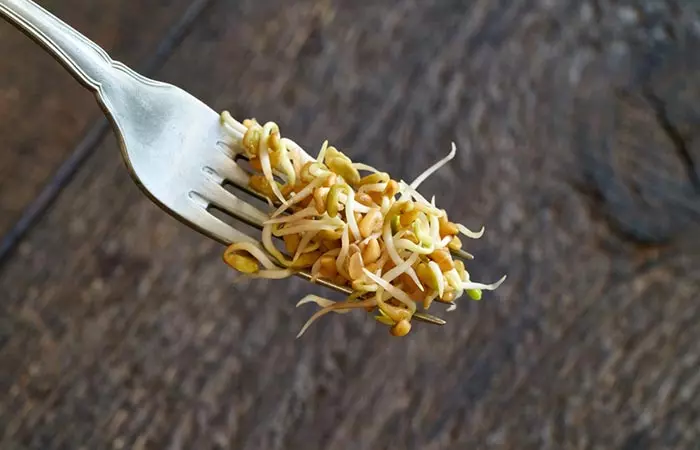
In the ancient ayurvedic medicinal tradition, fenugreek is long known to boost libido and sexual performance (20). Recent research corroborates this fact.
Key Takeaways
- Fenugreek sprouts help balance the sugar levels in the body. Opt for eating these sprouts if you suffer from type 2 diabetes.
- Eating fenugreek seeds as a snack can impact your hunger pangs by reducing them, as it contains a polysaccharide known as galactomannan that keeps you full for longer.
- You can prevent combat free radicals in their quest for cell damage by adding fenugreek sprouts to your diet. Moreover, they are a great source of antioxidants, thus acting as a preventive against the risk of certain cancers.
- You can improve your digestive system by eating these sprouts as these help to relieve constipation.
Fenugreek Sprouts Benefits For Healthy Skin and Hair
12. May Help Combat Signs Of Aging
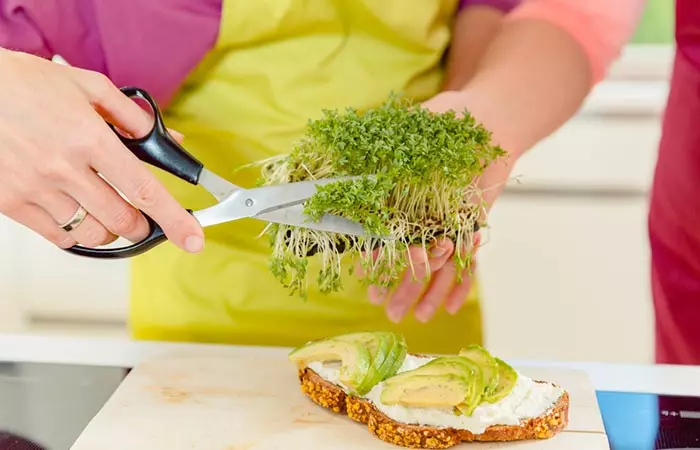
A rich source of antioxidants, fenugreek counters free radicals that damage skin cells to bring on early signs of aging hence consumption of fenugreek sprout can delay aging signs like wrinkles, crow’s feet, fine lines and pigmentation (21).
13. May Help Get Clear Acne-Free Skin
Consuming fenugreek sprouts is known to cool the digestive system and relieve constipation which often is the reason behind acne and pimples(22), (23). Thus, it may help you attain smooth, blemish-free skin.
14. May Help Combat Hair Fall, Dandruff, And Dull Hair

Consumption of fenugreek sprouts is an effective way to combat hair loss as it is rich in antioxidants which are responsible for fighting free radicals that cause cellular damage, the primary cause of hair fall. It is extremely effective in nourishing hair from the roots and combating follicular problems as it contains hormone antecedents that promote hair growth and proactively rebuild damaged hair. Using fenugreek seeds for hair is a good remedy. They contain proteins and nicotinic acid, which, when consumed in the right amount, can stimulate hair growth and repair damaged follicles. Fenugreek is effective against hair loss, thinning, and dull hair (24).
Barbara Kovalenko, a nutrition consultant, says, “It is generally considered safe to eat fenugreek seeds daily, but it’s best to consult a doctor as consuming large amounts may cause side effects, such as diarrhea and digestive problems.” She adds, “Some people may experience gas and digestive discomfort when consuming fenugreek sprouts, but this varies from person to person.”
She continues, “The recommended daily intake of fenugreek sprouts is not well established, but a moderate amount should be sufficient to reap its health benefits.”
 Quick Tip
Quick TipKokila Patel, a blogger, shares in one of her blog posts her successful fenugreek seed sprouting process. She soaked the seeds in water for 24 hours and kept them in a bowl in a dark place. After repeating the process for 4-5 days, she reveals the following result: “Mine sprouted in four days, almost larger than my fingers. Happy with the results, looks amazing and sprouted perfectly, not to mention tastes amazingly delicious (i).”
The various health benefits of fenugreek sprouts can be attributed to their rich nutritional profile. Check out the next section to know more.
Nutritional Facts Of Fenugreek Sprouts
Germinated fenugreek seeds have a similar nutrition profile as non-germinated seeds. Therefore, we have provided the nutritional profile of the seeds below. A hundred grams of fenugreek seeds contain the following nutrients (25):
| Nutrient | Amount |
|---|---|
| Energy | 323 kcal |
| Carbohydrate | 58.4 g |
| Fiber | 24.6 g |
| Protein | 23 g |
| Water | 8.84 g |
| Fat | 6.41 g |
| Potassium | 770 mg |
| Phosphorus | 296 mg |
| Magnesium | 191 mg |
| Calcium | 176 mg |
| Sodium | 67 mg |
| Iron | 33.5 mg |
| Vitamin C | 3 mg |
| Zinc | 2.5 mg |
| Niacin | 1.64 mg |
| Manganese | 1.23 mg |
| Copper | 1.11 mg |
| Thiamin | 0.322 mg |
| Riboflavin | 0.366 mg |
To avail the benefits of fenugreek sprouts, you can include this in your diet. But how? Read on to learn more.
Culinary Uses Of Fenugreek Sprouts
You can use fenugreek sprouts in various ways:
- You can toss them into salads for a fresh, slightly bitter taste.
- Mix them into your sandwiches or wraps for a crunchy, flavorful twist.
- You may try using them as a garnish on soups, curries, or stir-fries.
- Blend them into your smoothies for a healthy boost.
- Sprinkle them over rice or grain bowls for some extra texture and nutrition.
Infographic: Top 5 Health Benefits Of Fenugreek Sprouts
Fenugreek sprouts are easily available for use as a home remedy. They have many uses to improve skin and hair health. However, their most important use is in helping in the treatment and prevention of common yet serious health conditions. Check out the following infographic to learn more.
Some thing wrong with infographic shortcode. please verify shortcode syntaxThe benefits of fenugreek sprouts are many. Not only are they delicious and featured in many savory dishes, but they also are a good source of phytonutrients, potent antioxidants, essential fatty acids, micronutrients, dietary fiber, vitamins, and minerals. These organic sprouts may help manage diabetes and weight loss. They also may help promote heart, gut, and reproductive health, and have various other health-boosting benefits. However, excessive use may have side effects. If you experience any adverse effects, limit its use and seek medical advice.
Frequently Asked Questions
Are poppy seeds good for the liver?
Feder says, “Poppy seeds can be great for maintaining liver health. They are loaded with healthy polyunsaturated fats and antioxidants that can help keep inflammation under control throughout our bodies, including our liver. The antioxidants can help prevent/ fight off free radical damage and keep the liver functioning properly.”
What does fenugreek do for females?
Fenugreek has many health benefits, especially for women. It improves breast milk production, relieves menstrual cramps, and enhances sex drive (20), (26), (27). Also, many women use fenugreek powder for skin, hair, and overall health.
Is fenugreek harmful to the kidney?
No. Fenugreek benefits the kidneys. It protects against kidney stone formation and associated free radical complications in renal tissues (28).
Does fenugreek increase breast size?
Yes. The estrogenic activities of fenugreek seeds may help enhance breast size (29).
Is fenugreek harmful to the liver?
The presence of polyphenolsi Plant compounds that occur naturally and have antioxidant properties, aid in disease prevention, and contain other health benefits. in fenugreek protects the liver from alcohol toxicity (30).
Illustration: Amazing Benefits and Uses Of Fenugreek Sprouts For Skin, Hair and Health
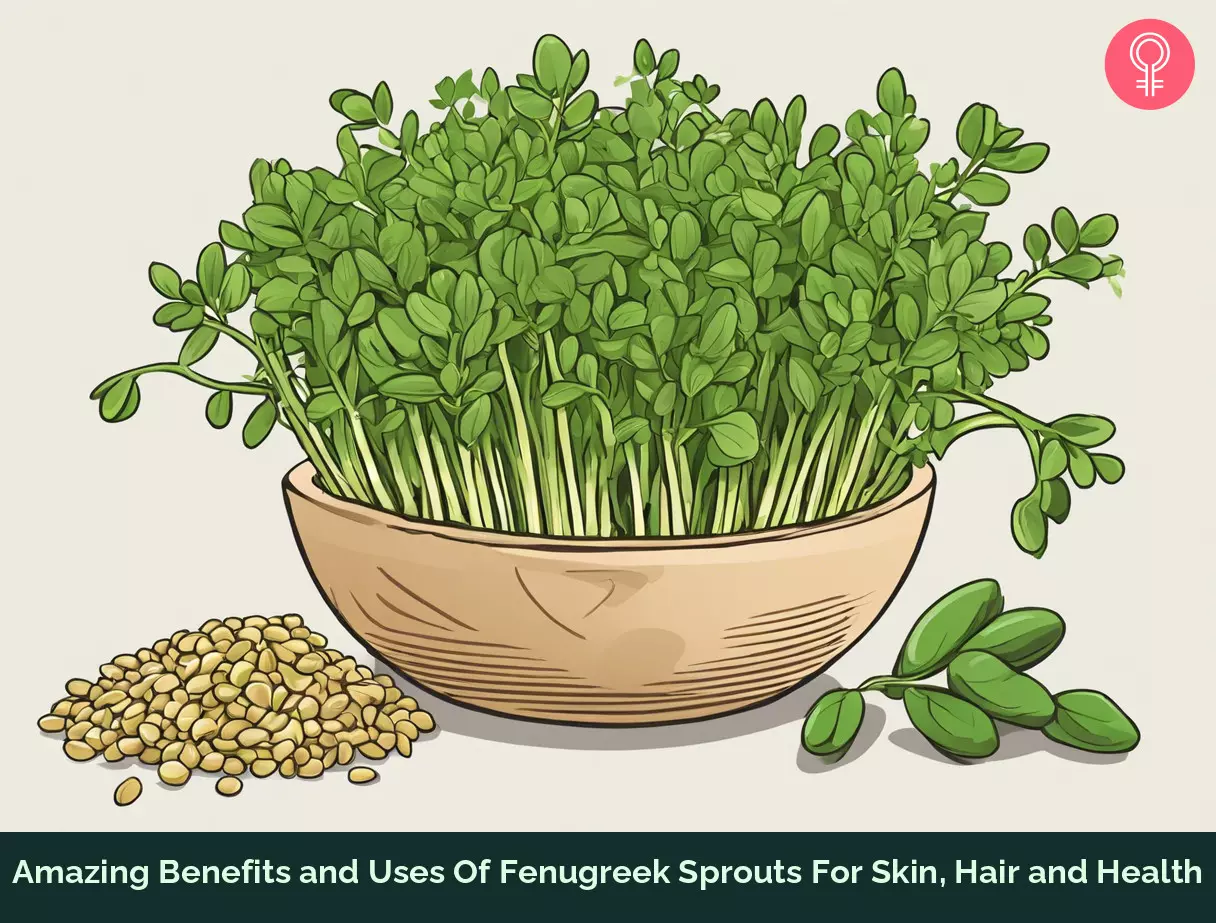
Image: Stable Diffusion/StyleCraze Design Team
Fenugreek sprouts are packed with health benefits! Check this video to learn how they can help improve digestion, reduce inflammation, and boost your immune system.
Personal Experience: Source
StyleCraze's articles are interwoven with authentic personal narratives that provide depth and resonance to our content. Below are the sources of the personal accounts referenced in this article.
i. Tips and tricks on how to sprout fenugreek sprouts
https://kokilaskitchengarden.wordpress.com/2025/03/06/tips-and-tricks-on-how-to-sprout-fenugreek-sprouts/
References
Articles on StyleCraze are backed by verified information from peer-reviewed and academic research papers, reputed organizations, research institutions, and medical associations to ensure accuracy and relevance. Read our editorial policy to learn more.
- Fenugreek a multipurpose crop: Potentialities and improvements
https://www.ncbi.nlm.nih.gov/pmc/articles/PMC4894452/ - Diosgenin a Steroidal Saponin Inhibits Migration and Invasion of Human Prostate Cancer PC-3 Cells by Reducing Matrix Metalloproteinases Expression
https://journals.plos.org/plosone/article?id=10.1371/journal.pone.0020164#:~:text=Diosgenin%2C%20a%20steroidal%20saponin%20obtained - Insulin-Sensitizer Effects of Fenugreek Seeds in Parallel with Changes in Plasma MCH Levels in Healthy Volunteers
https://www.ncbi.nlm.nih.gov/pmc/articles/PMC5877632/ - A simple dietary addition of fenugreek seed leads to the reduction in blood glucose levels: A parallel group randomized single-blind trial
https://www.ncbi.nlm.nih.gov/pmc/articles/PMC5954247/ - Fenugreek Seed Extract Inhibit Fat Accumulation and Ameliorates Dyslipidemia in High Fat Diet-Induced Obese Rats
https://www.ncbi.nlm.nih.gov/pmc/articles/PMC4020548/ - Effect of two doses of Fenugreek Flakes (FenuLean TM ) on appetite body-weight and blood glucose homeostasis: A randomized double-blind multicenter three-arm long-term control study in 100 healthy subjects
https://www.researchgate.net/publication/337651103_Effect_of_two_doses_of_Fenugreek_Flakes_FenuLean_TM_on_appetite_body-weight_and_blood_glucose_homeostasis_A_randomized_double-blind_multicenter_three-arm_long-term_control_study_in_100_healthy_subject - Effect of Fenugreek Fiber on Satiety Blood Glucose and Insulin Response and Energy Intake in Obese Subjects
https://www.researchgate.net/publication/24263935_Effect_of_Fenugreek_Fiber_on_Satiety_Blood_Glucose_and_Insulin_Response_and_Energy_Intake_in_Obese_Subjects - Effect of fenugreek consumption on serum lipid profile: A systematic review and meta-analysis
https://pubmed.ncbi.nlm.nih.gov/32385866/ - Lowering Blood Cholesterol to Prevent Heart Disease
https://jamanetwork.com/journals/jama/article-abstract/397825 - Sodium and Potassium Intake: Effects on Chronic Disease Outcomes and Risks
https://www.ncbi.nlm.nih.gov/books/NBK519332/ - Potassium Intake and Blood Pressure: A Dose‐Response Meta‐Analysis of Randomized Controlled Trials
https://www.ncbi.nlm.nih.gov/pmc/articles/PMC7429027/ - Fenugreek a multipurpose crop: Potentialities and improvements
https://www.ncbi.nlm.nih.gov/pmc/articles/PMC4894452/ - Fenugreek: A review on its nutraceutical properties and utilization in various food products
https://www.sciencedirect.com/science/article/pii/S1658077X15301065 - Antioxidant properties of germinated fenugreek seeds
https://www.researchgate.net/publication/7450628_Antioxidant_properties_of_germinated_fenugreek_seeds - The selective cytotoxic anti-cancer properties and proteomic analysis of Trigonella Foenum-Graecum
https://pubmed.ncbi.nlm.nih.gov/24679057/ - Fenugreek
https://www.ncbi.nlm.nih.gov/books/NBK548826/ - Effects of Fenugreek Seed on the Severity and Systemic Symptoms of Dysmenorrhea
https://www.ncbi.nlm.nih.gov/pmc/articles/PMC3955423/ - Effect of Fenugreek on vasomotor symptoms in menopausal women
https://www.ncbi.nlm.nih.gov/pmc/articles/PMC7306339/ - Use of herbal medicines among pregnant women attending family health centers in Alexandria
https://www.sciencedirect.com/science/article/pii/S1110569012000118 - Physiological aspects of male libido enhanced by standardized Trigonella foenum-graecum extract and mineral formulation
https://pubmed.ncbi.nlm.nih.gov/21312304/ - Ethanolic Fenugreek Extract: Its Molecular Mechanisms against Skin Aging and the Enhanced Functions by Nanoencapsulation
https://pubmed.ncbi.nlm.nih.gov/35215366/ - Fenugreek Cultivation with Emphasis on Historical Aspects and its uses in Traditional Medicine and Modern Pharmaceutical Science
https://pubmed.ncbi.nlm.nih.gov/33245271/ - The relationship between acne vulgaris and irritable bowel syndrome: A preliminary study
https://pubmed.ncbi.nlm.nih.gov/32463985/ - Fenugreek+micronutrients: Efficacy of a food supplement against hair loss
https://www.researchgate.net/publication/251923543_Fenugreekmicronutrients_Effica - Spices, fenugreek seed
https://fdc.nal.usda.gov/fdc-app.html#/food-details/171324/nutrients - Influence of a Specialized Trigonella foenum-graecum Seed Extract (Libifem), on Testosterone, Estradiol and Sexual Function in Healthy Menstruating Women, a Randomised Placebo Controlled Study
https://pubmed.ncbi.nlm.nih.gov/25914334/ - Effect of Fenugreek ( Trigonella Foenum-Graecum ) on Ethylene Glycol Induced Kidney Stone in Rats
https://www.researchgate.net/publication/268219082_Effect_of_Fenugreek_Trigonella_Foenum-Graecum_on_Ethylene_Glycol_Induced_Kidney_Stone_in_Rats - Effect of Fenugreek ( Trigonella Foenum-Graecum ) on Ethylene Glycol Induced Kidney Stone in Rats
https://www.researchgate.net/publication/268219082_Effect_of_Fenugreek_Trigonella_Foenum-Graecum_on_Ethylene_Glycol_Induced_Kidney_Stone_in_Rats - In vitro estrogenic activities of fenugreek Trigonella foenum graecum seeds
https://pubmed.ncbi.nlm.nih.gov/20571172/ - Fenugreek (Trigonella foenum graecum) seed polyphenols protect liver from alcohol toxicity: a role on hepatic detoxification system and apoptosis
https://pubmed.ncbi.nlm.nih.gov/17484288/
Read full bio of Dr. Pallavi Srivastava
- Barbara Kovalenko is a nutritional consultant with 4 years of experience in nutrition and mindful eating coaching. She earned her bachelor's degree in nutrition from Bogomolets National Medical University, Ukraine and master's degree from Boston University, USA.
 Barbara Kovalenko is a nutritional consultant with 4 years of experience in nutrition and mindful eating coaching. She earned her bachelor's degree in nutrition from Bogomolets National Medical University, Ukraine and master's degree from Boston University, USA.
Barbara Kovalenko is a nutritional consultant with 4 years of experience in nutrition and mindful eating coaching. She earned her bachelor's degree in nutrition from Bogomolets National Medical University, Ukraine and master's degree from Boston University, USA.
Read full bio of Tanya Choudhary
Read full bio of Ravi Teja Tadimalla
Read full bio of Moksha Gandhi







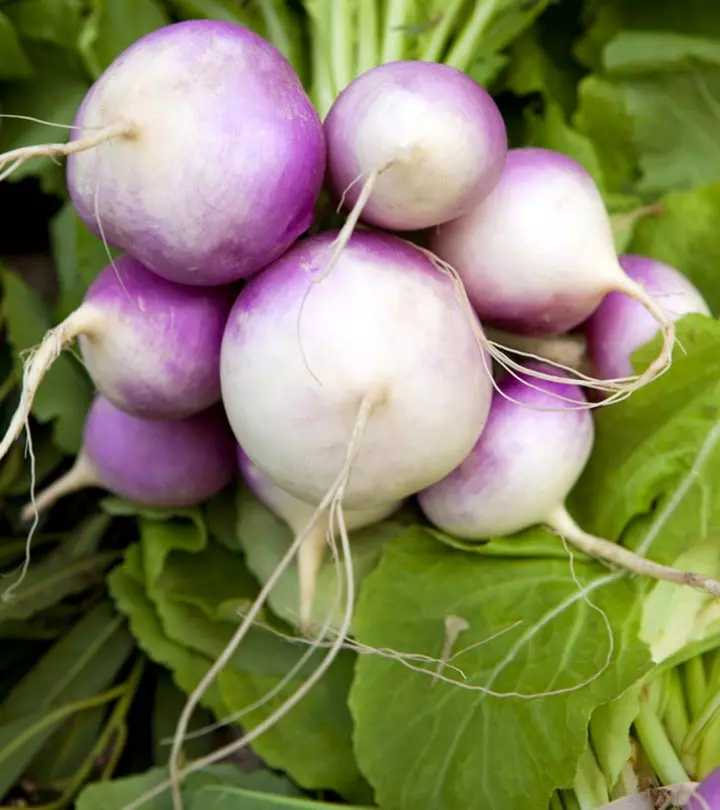
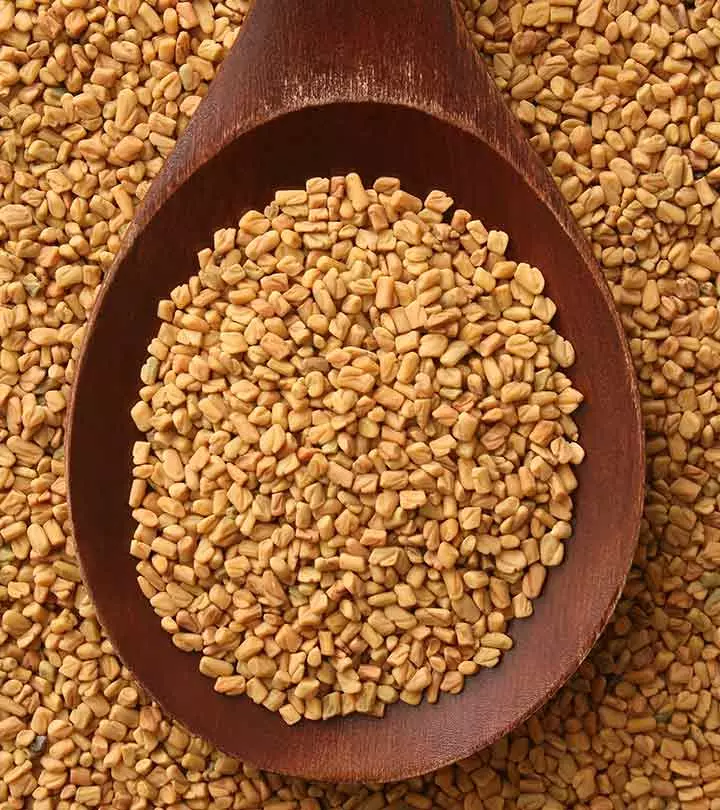
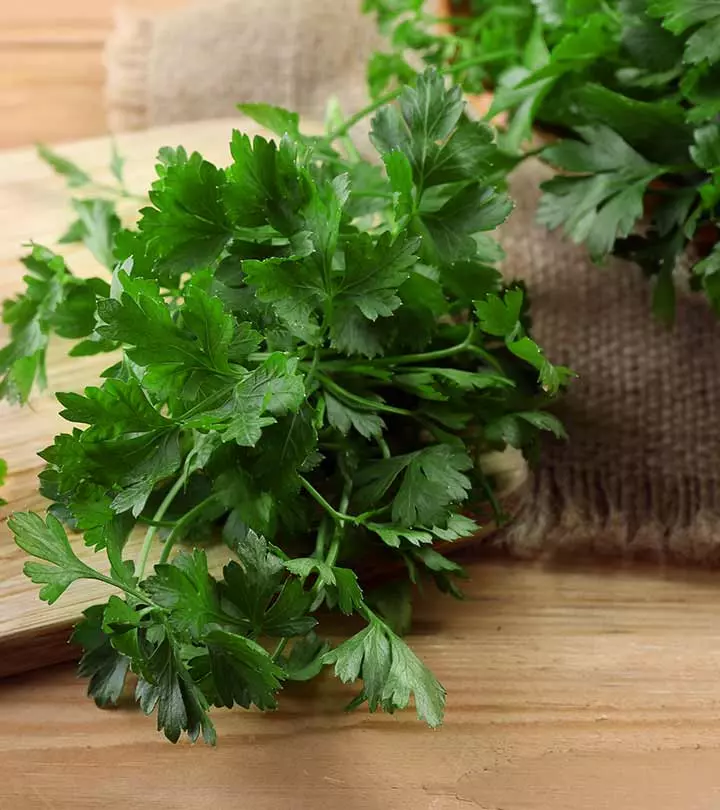
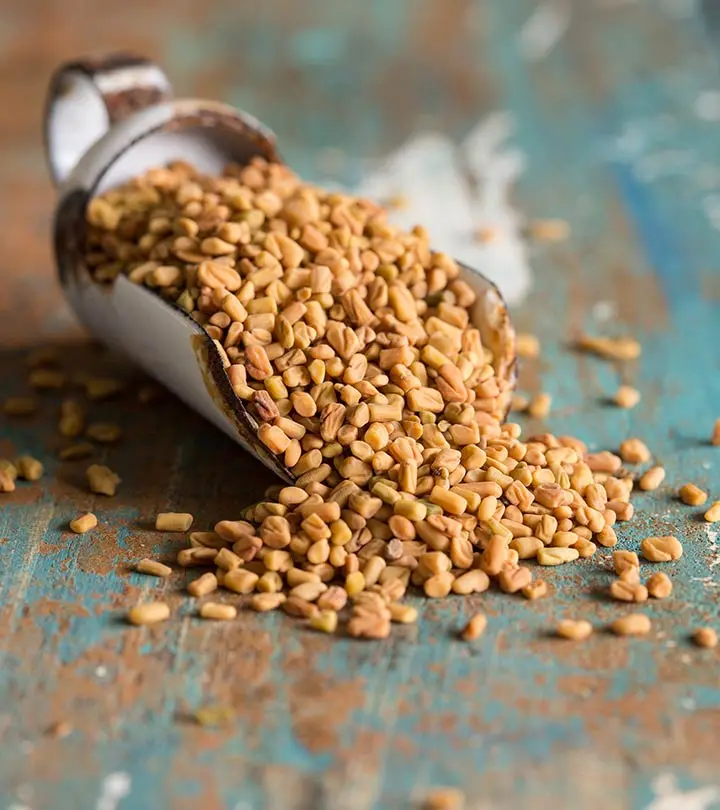
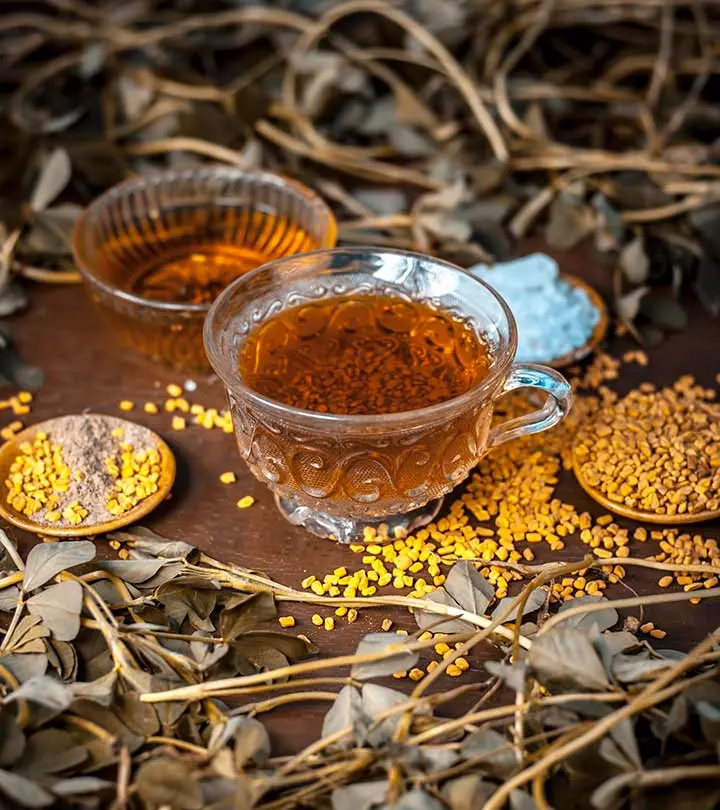
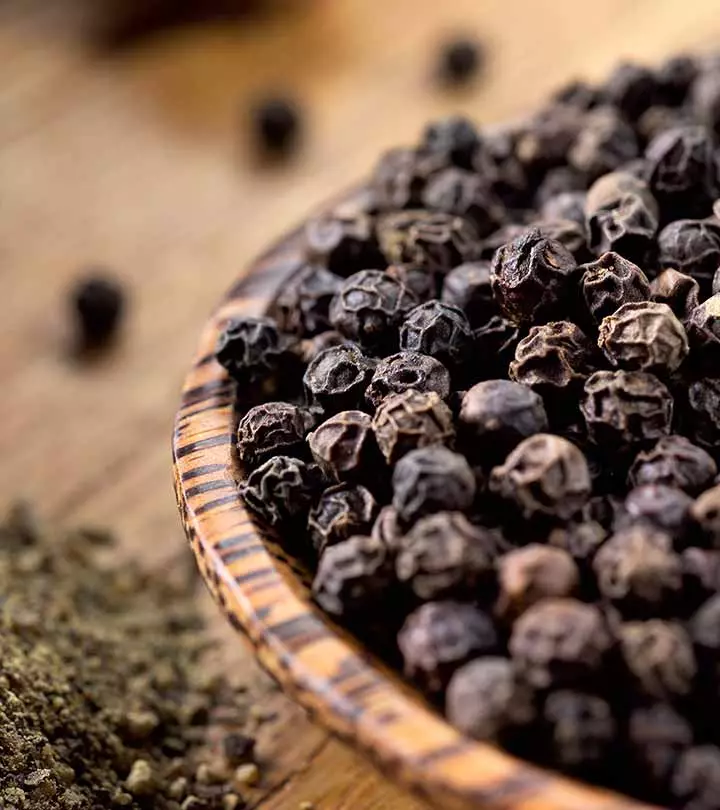
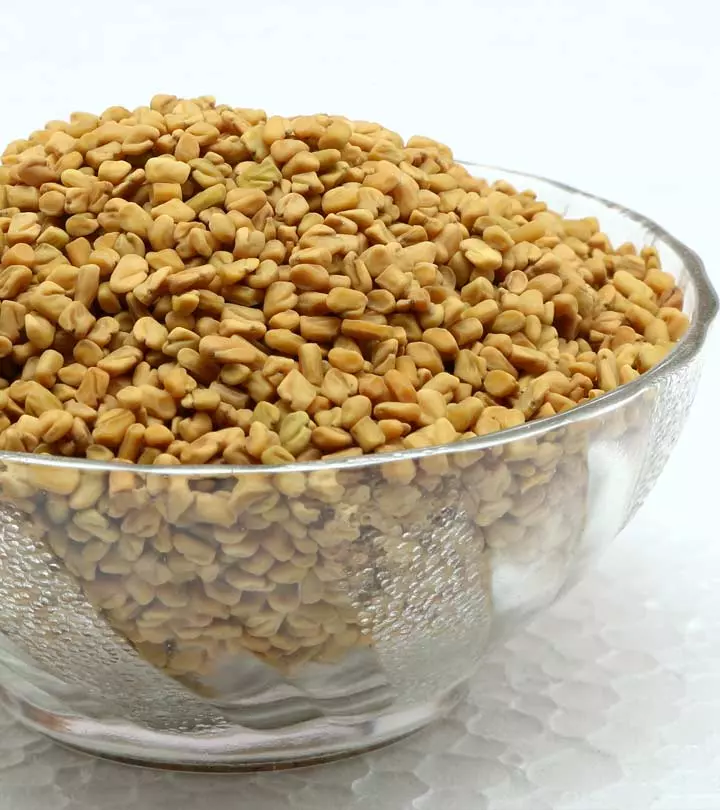
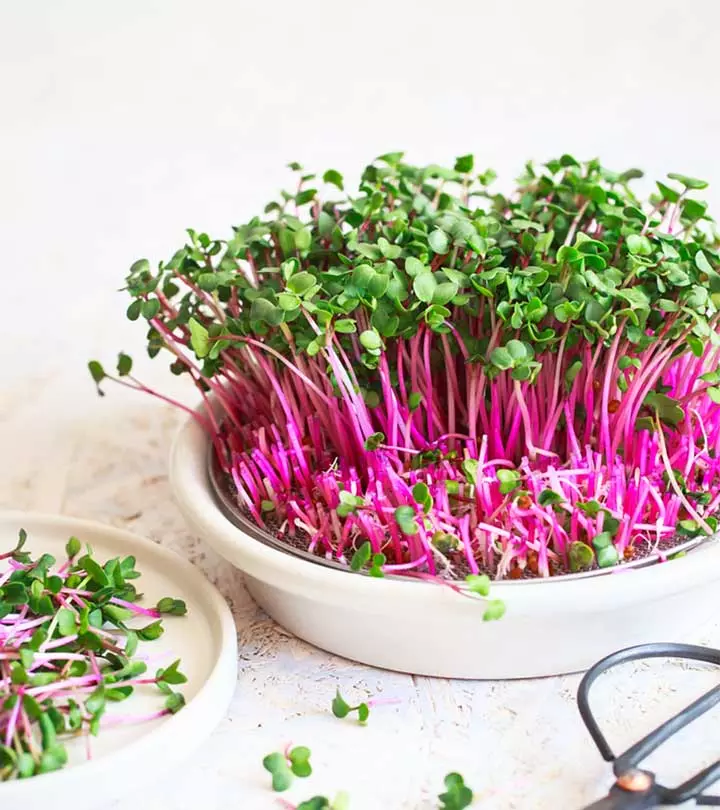
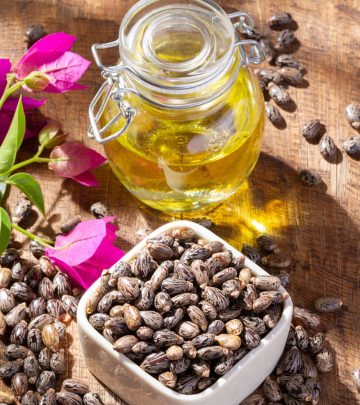
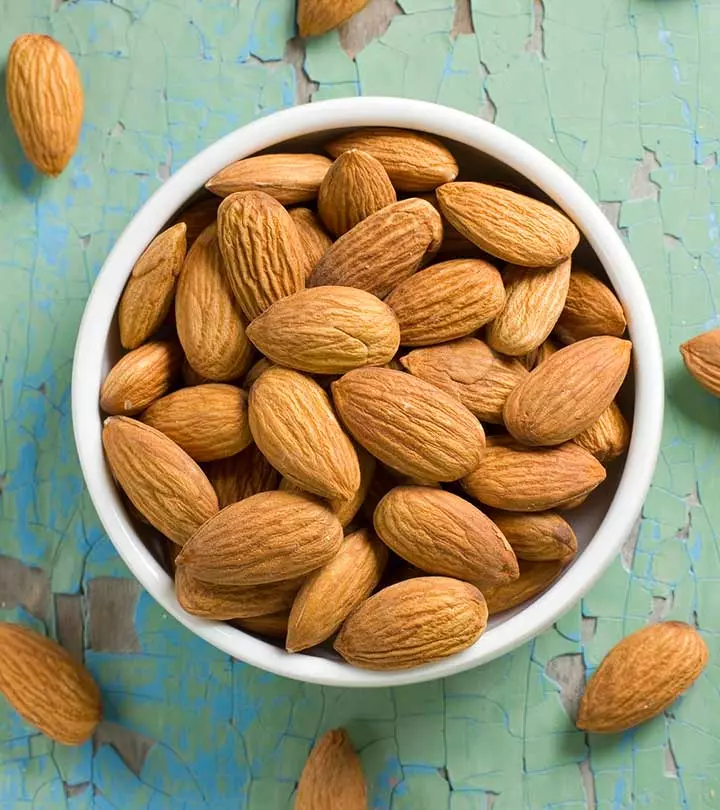
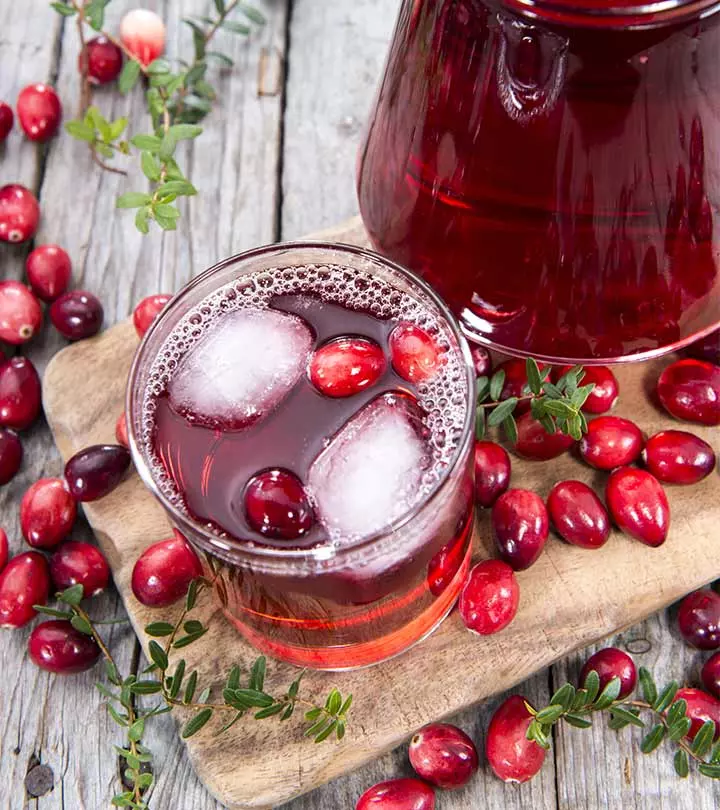
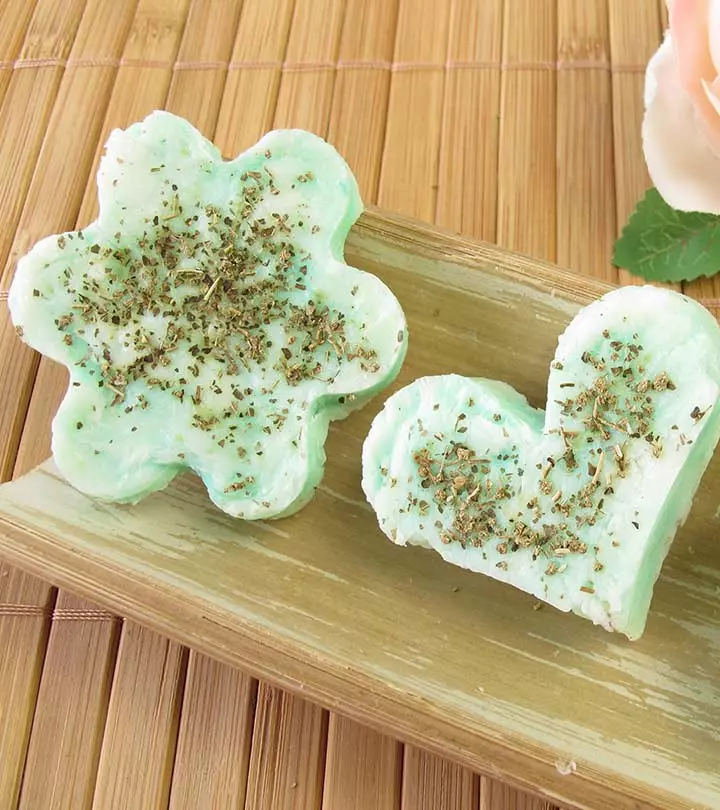
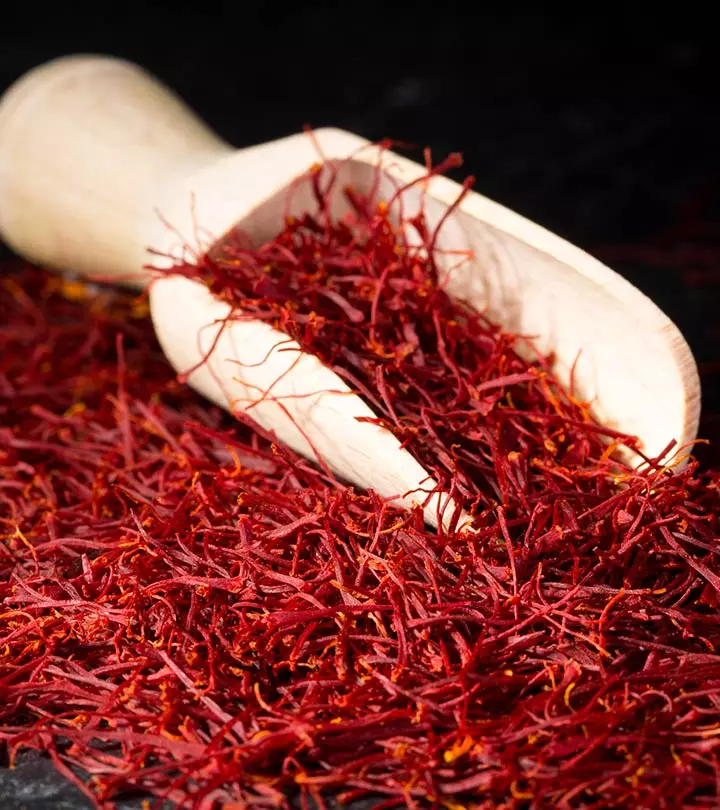
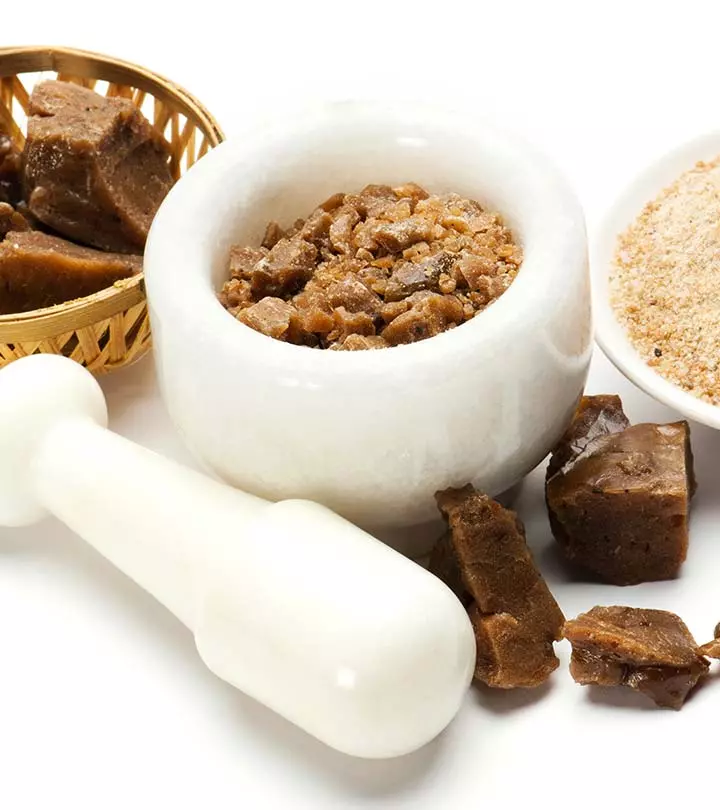

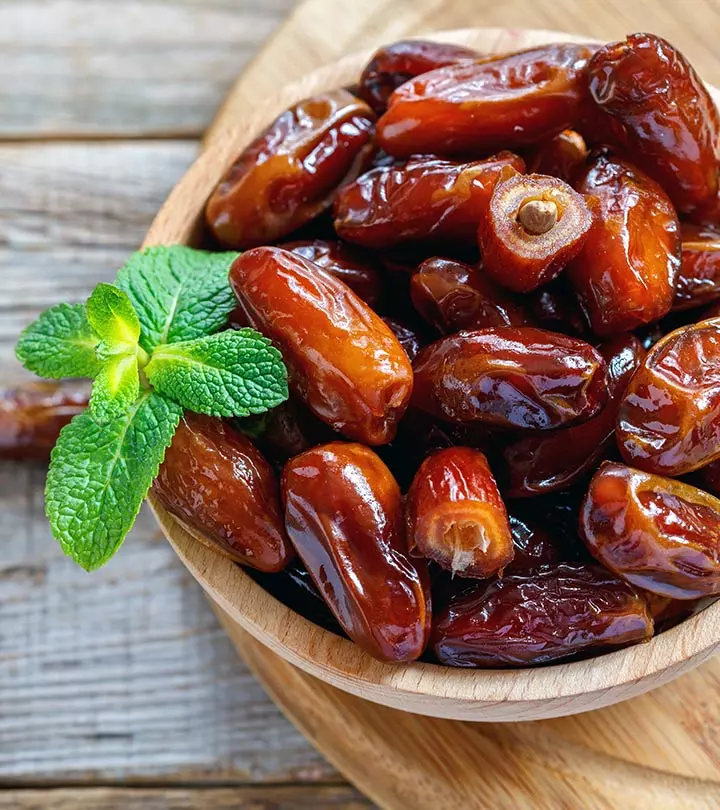



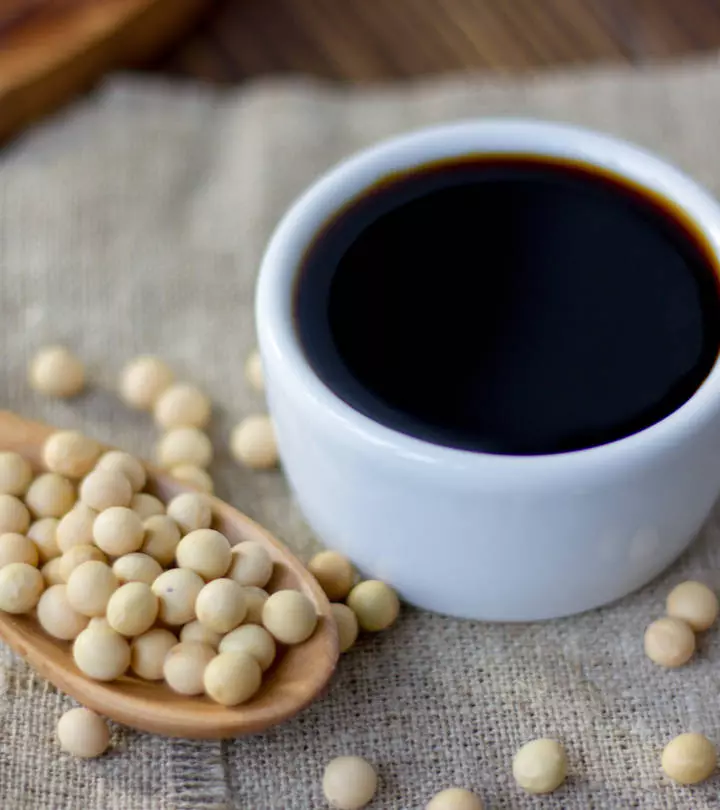
Community Experiences
Join the conversation and become a part of our empowering community! Share your stories, experiences, and insights to connect with other beauty, lifestyle, and health enthusiasts.